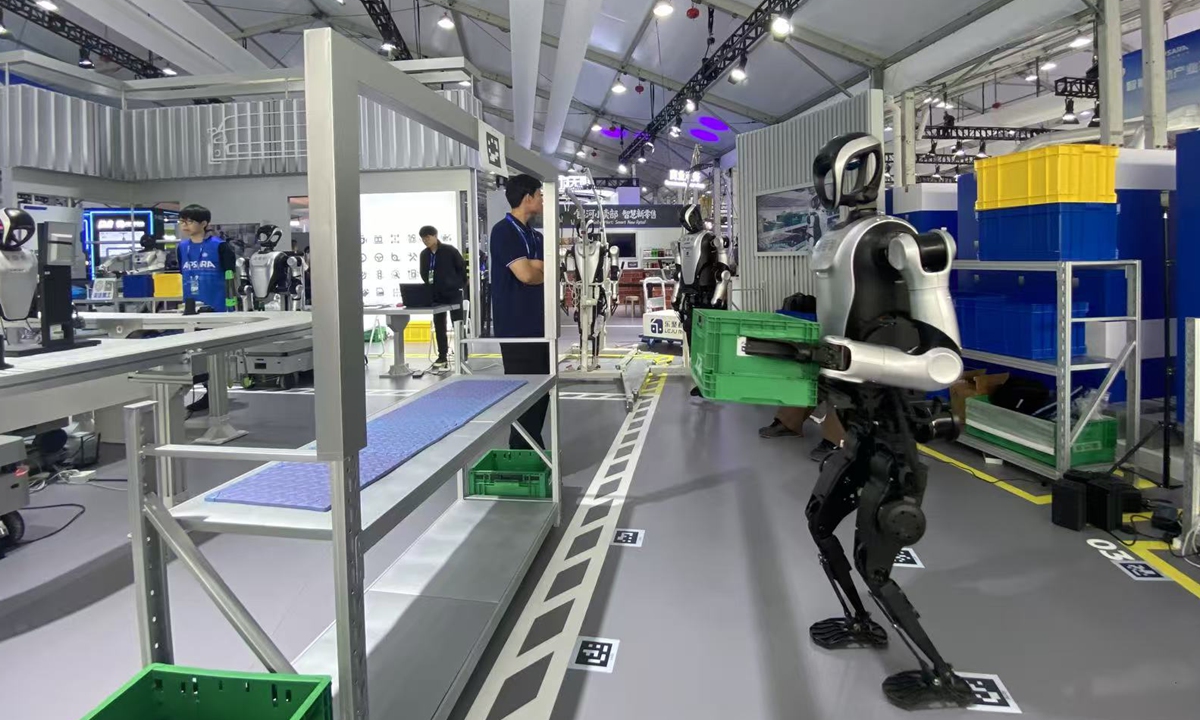
The Apsara Conference 2025 kicked off on September 24,2025 in Hangzhou, East China’s Zhejiang Province. Photo: Zhang Weilan/GT
The rapid advancement of artificial intelligence (AI) technology has sparked a surge in demand for computing power, prompting Chinese tech companies to expand their AI infrastructure overseas. At the ongoing Apsara Conference 2025 in Hangzhou, East China’s Zhejiang Province, industry experts and representatives of leading tech firms such as Alibaba and Nvidia highlighted the critical role of computing power in driving AI innovation across various sectors.
They said that the spillover effects of computing power are permeating in numerous industries and cutting-edge science. With the support of powerful computing capabilities, cutting-edge AI applications such as humanoid robots and large-language AI models independently developed by Chinese companies are beginning to demonstrate their practical value in serving human production and daily life, the Global Times learned on Thursday.
Computing power, roughly referring to the ability to process data, includes information infrastructure and technologies to support information computing power, data storage and network capacity in the era of the digital economy.
At the conference, a dedicated pavilion showcased the latest advancements in computing power, featuring major international service providers like Nvidia, AMD and Intel. At the pavilion, Nvidia’s Omniverse and Cosmos platforms demonstrated how virtual environments can be used for training humanoid robots, allowing for cost-effective strategy adjustments.
AMD showcased its latest processors and graphics cards, emphasizing their AI capabilities in personal computers. The company is collaborating with Alibaba to enhance performance and reduce costs in cloud server applications, AMD technician Zhang Yi’an told the Global Times on Thursday.
Experts said that a country’s total computing power, the proportion of advanced computing power, and the efficiency of its scheduling and utilization together constitute its core competitiveness in the digital age. Building independent and controllable computing infrastructure and large-language models is vital for countries seeking to lead in the intensifying AI race.
In a move to expand its global AI infrastructure, Alibaba Cloud announced on Wednesday that it will open its data centers in Brazil, France and the Netherlands. The company will also add facilities in Mexico, Japan, South Korea, Malaysia and Dubai over the coming year, expanding its current network of 91 areas of operation across 29 regions, Alibaba said in a statement sent to the Global Times.
The announcement comes as Alibaba positions AI, which includes cloud, as a core business priority. “The speed of AI industry development has far exceeded our expectations, and the industry’s demand for AI infrastructure has also far exceeded our expectations. The expansion is essential to meet rising demand from AI developers and enterprise customers,” Alibaba Group Eddie Wu Yongming CEO said at the conference.
He also pledged to increase the company’s capital expenditure on AI infrastructure from the original 380 billion yuan ($53 billion) over the next three years.
Wu’s pledge of additional investment comes along with increased AI spending by US tech giants. Nvidia said it would invest $100 billion into OpenAI to help the US AI giant build and deploy at least 10 gigawatts of AI data centers for next-generation AI infrastructure, according to Bloomberg reports.
Analysts said that the move highlights how Chinese tech giants are seeking international reach despite increasing competition in both the domestic and global AI markets.
As the demand for intelligent computing power surges, driven by advancements in generative AI models, autonomous driving, the low-altitude economy, embodied intelligence, smart cities, and industrial manufacturing, China is promoting independent and controllable development of the entire industry chain, from underlying hardware to upper-layer applications, Niu Zhankui, a researcher at the Beijing-based think tank Pangoal Institution, told the Global Times on Thursday.
At the hardware level, domestic AI chip companies are using iteration and promoting market adoption, striving to overcome external constraints in high-end chip supply. At the software level, the industry is actively developing the CUDA ecosystem and Graphics Processing Unit computing technology, aiming to build a solid foundation for China’s AI industry, Niu said.
Investment in computing power by Chinese major telecom operators is expected to maintain a growth rate of more than 20 percent this year. The AI investment of leading internet enterprises in the next three years is expected to exceed 500 billion yuan, which brings a broad space for the construction of information and communications technology infrastructure, according to a ZTE report in March.
Experts said the growth is being driven by continued AI computing investments by state-owned telecommunications network operators – China Mobile, China Unicom and China Telecom – as well as private tech firms such as Tencent, Baidu and Alibaba.
China is rapidly advancing its computing capabilities through innovation in optical networks, integrated power-computing systems, and large-scale clustering technologies. “Home-grown chips are expanding China’s computing capacity. Meanwhile, we’re competitive in green energy supply, liquid cooling technology, and heterogeneous data center construction,” Niu said. However, he mentioned that China still lags behind in research and development for high-end chips.
China’s total intelligent computing capacity has reached 780,000 PFlops (Peta floating-point operations per second), which ranks second in the world, said Liu Liehong, head of the National Data Administration, the Xinhua News Agency reported.
